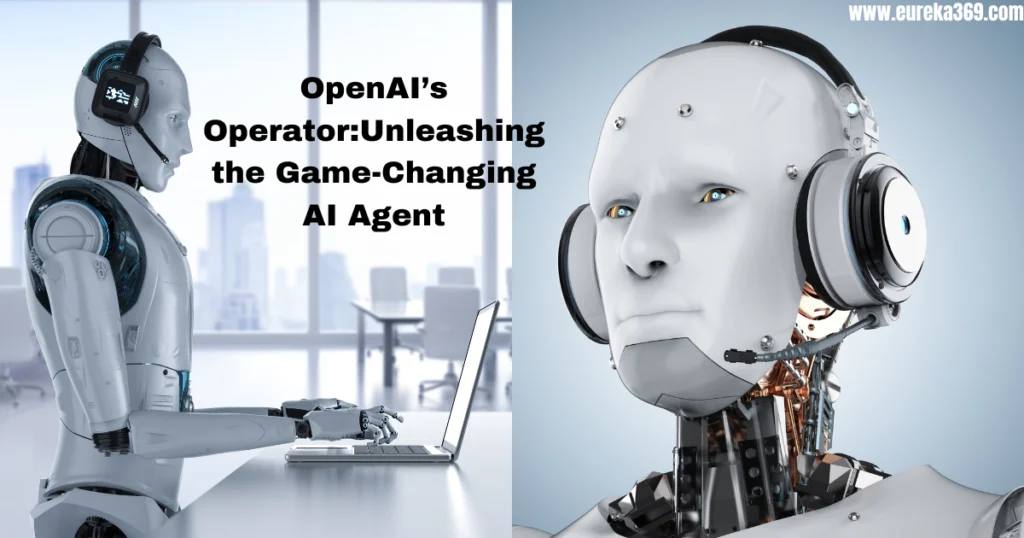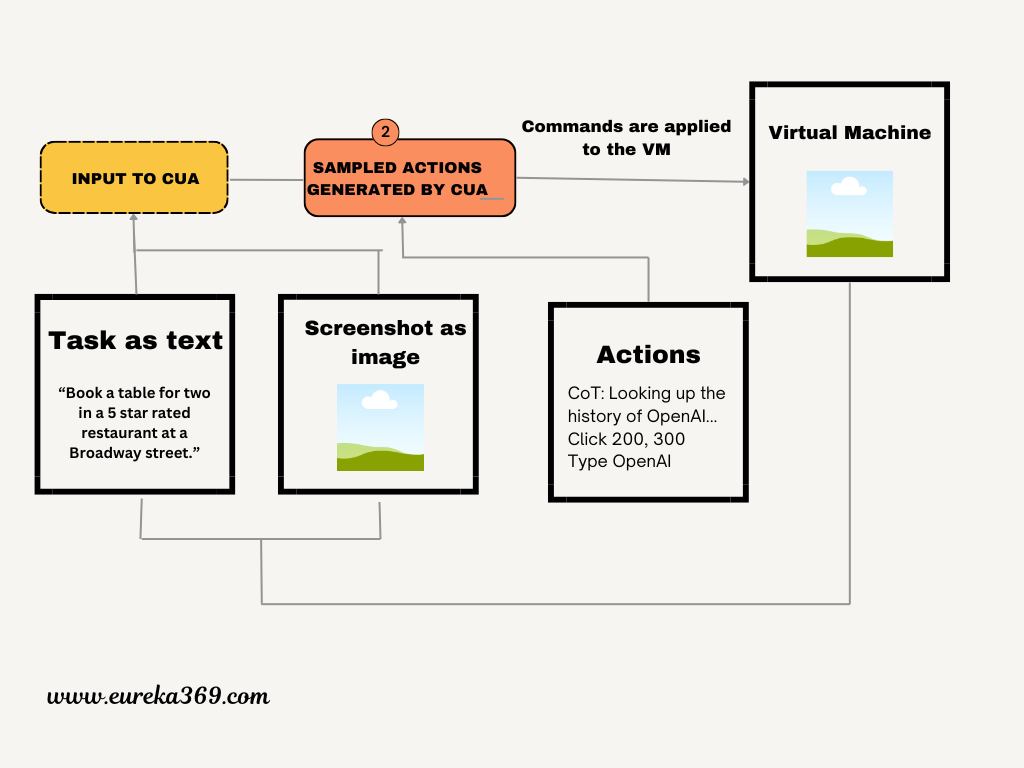“For individuals managing busy schedules, OpenAI’s Operator can automate tasks such as setting reminders, scheduling meetings, and organizing to-do lists.”

Introduction
The rapid evolution of artificial intelligence has ushered in a new era of digital assistants with AI agents becoming increasingly sophisticated and capable. Among the latest advancements in this field is OpenAI’s newly announced Operator, which was officially launched on January 23, 2025.
“As a Computer-Using Agent (CUA), Operator is designed to streamline various activities, from booking concert tickets to grocery orders, all while leveraging the power of GPT-4o, OpenAI’s latest large language model. Operator automates a variety of online tasks. “
Moreover, It represents a significant leap forward in AI agent technology, promising to enhance productivity and streamline everyday activities for users. As we explore the features and implications of this groundbreaking tool, it becomes clear that Operator is not just another AI agent; it is a transformative force in the realm of digital assistance.
This blog post will explore the significance of OpenAI’s Operator, its technical capabilities, and the implications for users and industries alike.
Sam Altman’s Perspective
In a recent statement, OpenAI CEO, Sam Altman emphasized the importance of Operator in the context of AI’s future. He stated,
“Operator is designed to empower users by taking on mundane tasks, allowing them to focus on what truly matters,”
Altman highlighted that the development of Operator aligns with OpenAI’s broader vision of creating AI technologies that enhance human capabilities rather than replace them. He further noted,
“We believe that by providing users with a powerful tool like Operator, we can help them navigate the complexities of the digital world more efficiently.”
This perspective underscores OpenAI’s commitment to responsible AI development and its focus on user-centric solutions.
Technical Deep Dive
Comprehensive Feature Analysis
OpenAI’s Operator boasts a range of features that set it apart from existing AI agents. Here’s a detailed breakdown of its capabilities:
- Multimodal Functionality: Operator can process and respond to various types of inputs, including text, voice, and images. This multimodal approach allows for a more natural interaction, making it easier for users to communicate their needs.
- Remote Browser Integration: One of the standout features of Operator is its ability to function as a remote browser. Users can instruct the AI to perform online tasks, such as searching for information or making bookings, directly from the chat interface.
- Task Management and Automation: Operator excels in automating routine tasks. Whether it’s scheduling appointments or managing grocery orders through platforms like Instacart, the AI agent can handle multiple tasks simultaneously, improving overall efficiency.
- Collaboration with Third-Party Services: Operator is designed to work with popular services like OpenTable for restaurant reservations and StubHub for ticket purchases. This integration allows users to complete transactions without leaving the chat interface.
- User Instructions and Customization: Users can provide specific instructions to tailor the AI’s responses and actions. This level of customization enhances the user experience, making it more personal and effective.
How OpenAI’s Operator Operates?

OpenAI’s Computational User Agent (CUA) decodes screen pixel data to comprehensively understand digital environments, employing virtual input mechanisms to autonomously execute complex tasks. By processing visual information and dynamically adapting to changing contexts, CUA can navigate diverse digital interfaces without requiring specialized integration protocols.
Operational Framework
- Perception: Captures computer screenshots to construct a real-time visual representation of the system’s current state, enabling comprehensive contextual understanding.
- Reasoning: Utilizes advanced chain-of-thought processing to strategically plan task execution. This cognitive approach allows systematic evaluation of observations, tracking progression, and intelligent adaptation to emerging challenges.
- Action: Executes precise digital interactions including clicking, scrolling, and text input. The system autonomously progresses through tasks while implementing strategic checkpoints for user validation during sensitive operations like authentication or CAPTCHA resolution.
This approach enables CUA to seamlessly handle multi-step processes, manage unexpected variations, and operate across varied digital environments with remarkable flexibility and intelligence.
Comparative Evaluation with Existing AI Agents
When compared to existing AI agents, OpenAI’s Operator stands out due to its comprehensive feature set and user-friendly interface. While many AI agents focus on specific tasks. However, Operator’s ability to manage a wide range of online activities positions it as a versatile solution for users seeking efficiency and convenience.
While other agents may excel in specific tasks, Operator’s autonomy makes it a powerful tool for a wide range of applications, particularly in the realm of automation and task management.
Performance Comparison Overview
1. Task Execution and Complexity
- OpenAI Operator: Designed for high autonomy, it can perform various online tasks like booking tickets or managing grocery orders directly through a browser interface. It utilizes the Computer-Using Agent (CUA) model, which has shown strong performance in benchmarks like WebVoyager, achieving an 87% success rate for web tasks.
- Anthropic Computer Use: This agent focuses on ethical decision-making and contextual awareness. While it is capable of performing tasks on a computer, it scored lower than Operator in web-based benchmarks, with a 56% success rate on WebVoyager.
- Google DeepMind’s Mariner: Similar to Operator, Mariner is designed for web-browsing tasks but operates within the user’s local browser. It achieved an 83.5% score on WebVoyager, making it competitive but still behind Operator.
2. Speed and Responsiveness
- Users have reported that Operator can be sluggish at times compared to expectations set during its demonstrations. This inconsistency in performance has raised concerns about its responsiveness.
- In contrast, while specific feedback on speed for Computer Use and Mariner is less documented, their performance appears more stable in controlled environments.
3. Ethical Considerations and Safety
- OpenAI Operator incorporates ethical guidelines and content filtering but prioritizes performance over ethical frameworks. It has undergone rigorous testing to ensure safety during task execution.
- Anthropic Computer Use, however, emphasizes ethical AI more heavily, embedding decision-making frameworks designed to minimize potential harm and prioritize beneficial outcomes.
4. Learning and Adaptability
- Operator benefits from continuous updates based on aggregated user interactions, allowing it to improve over time across various applications.
- Conversely, Anthropic’s approach focuses on individualized learning, adapting to specific user preferences for a more personalized experience.
| Feature | OpenAI’s Operator | Anthropic Computer Use | Google DeepMind’s Mariner |
|---|---|---|---|
| Success Rate (WebVoyager) | 87% | 56% | 83.5% |
| Task Complexity Handling | High (various online tasks) | Moderate (ethical focus) | Moderate (browser-based tasks) |
| Speed | Reported sluggishness | More stable performance | Not extensively documented |
| Ethical Framework | Basic guidelines | Strong emphasis | Basic guidelines |
| Learning Approach | Continuous improvement | Individualized adaptation | Not specified |
Practical Applications
The practical applications of OpenAI’s Operator are vast and varied. Here are some key use cases across different sectors:
“OpenAI’s Operator is a technological breakthrough that makes processes like ordering groceries incredibly easy.”
Daniel Danker, Chief Product Officer at Instacart
- E-commerce: Users can leverage Operator to manage their online shopping experiences. From grocery orders on Instacart to booking concert tickets on StubHub, the AI agent simplifies the purchasing process, making it more efficient.
- Travel and Hospitality: Operator can assist users in planning their trips by integrating with services like OpenTable for restaurant reservations and providing real-time updates on flight statuses. This capability enhances the overall travel experience, allowing users to focus on enjoying their journey.
- Personal Productivity: For individuals managing busy schedules, OpenAI’s Operator can automate tasks such as setting reminders, scheduling meetings, and organizing to-do lists. This level of automation frees up valuable time, allowing users to concentrate on more critical tasks.
- Remote Work: As remote work becomes increasingly prevalent, Operator can facilitate collaboration among team members by managing project timelines, setting up virtual meetings, and tracking progress on tasks. This functionality enhances team efficiency and communication.
- Education: In educational settings, Operator can assist students with research, provide study resources, and help manage assignments. This support can lead to improved academic performance and a more organized approach to learning.
You can have a look at the demonstration by Sam Altman, as to how it actually works in real word scenarios. OpenAI Introduces the Operator and Agents featuring Sam Altman or watch below:
What Industry Experts are Saying?
The launch of Operator has garnered attention from AI researchers and industry analysts alike. Dr. Emily Chen, a prominent AI researcher at Stanford University, remarked,
“Operator represents a significant advancement in the capabilities of AI agents. Its ability to navigate the web autonomously opens up new possibilities for automation in various sectors.”
Chen emphasized that the implications of such technology could extend beyond personal use, potentially transforming industries like e-commerce, travel, and customer service.
Industry analyst Mark Thompson also weighed in, stating,
“OpenAI’s Operator could redefine how we interact with digital services. By automating routine tasks, it allows users to allocate their time and resources more effectively.”
Thompson noted that the potential for increased efficiency could have far-reaching effects on both individual users and businesses.
However, some experts caution that the introduction of such powerful AI agents also raises ethical considerations. Dr. Sarah Patel, an ethicist specializing in AI, warned,
“As we integrate AI agents like Operator into our daily lives, we must remain vigilant about privacy and security concerns. Ensuring that these technologies are used responsibly will be crucial as they become more prevalent.”
Accessibility and Pricing
Operator is currently available exclusively to ChatGPT Premium users, with a subscription cost of $200 per month. OpenAI has indicated plans to expand access to other user tiers in the future, making the technology more widely available. This pricing structure positions Operator as a premium offering, reflecting its advanced capabilities and the value it provides to users.
In terms of geographical accessibility, OpenAI aims to make Operator available to users across various regions, although specific rollout timelines may vary. Institutions and businesses interested in leveraging Operator for their operations can also explore partnership opportunities with OpenAI to gain access to the technology.
Future Implications
The launch of OpenAI’s Operator marks a pivotal moment in the evolution of AI agents. With its advanced capabilities, seamless integration with third-party services, and user-friendly interface, Operator is poised to transform how we manage online tasks. As Sam Altman and industry experts have highlighted, the potential implications for productivity and efficiency are significant.
The future of AI agents like Operator is bright, with the potential to revolutionize various industries. As technology continues to advance, we can expect even more innovative features and applications that will further enhance the user experience.
“As we learn more about Operator during its research preview, we’ll be better equipped to identify ways that AI can make civic engagement even easier for our residents.”
Jamil Niazi, Director of Information Technology at City of Stockton
Conclusion
OpenAI’s Operator marks a significant milestone in the development of AI agents, showcasing the potential for automation to enhance productivity and streamline everyday tasks. With its unique technological capabilities and user-centric design, Operator is poised to make a lasting impact on how we interact with digital services.
As OpenAI continues to refine and expand access to this innovative tool, the future implications for both individual users and industries at large are immense. By strategically positioning itself at the forefront of AI agent technology, OpenAI is not only shaping the future of digital assistance but also setting the stage for responsible and impactful AI.
You can also read about how AI is transforming the methods of diagnosis and treatments in healthcare sector. Read on: AI and Healthcare Equity: Forging the Digital Divide



Leave a Reply